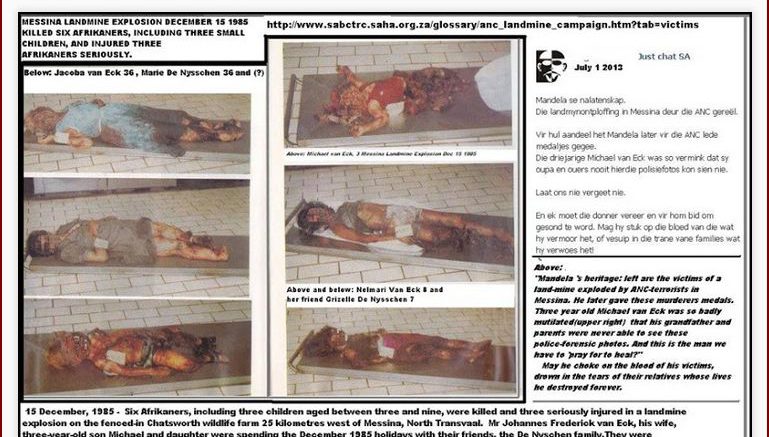By SUZANNE DALEY
Published: May 13, 1997
CAPE TOWN, May 12— South Africa’s governing party admitted today that it used torture, executions, and land mines during its fight against apartheid, opening a new chapter in this country’s efforts to come to terms with its past.
Senior officials of the African National Congress also said they could have done far more to stop the gruesome practice in the black townships of ”necklacing” people suspected of cooperating with the South African security forces. Such people were pinned inside a car tire, doused in gasoline, set on fire and left to die.
Party officials had long resisted appearing before the commission, saying their actions were excusable because they had been fighting a ”just war.” Today’s testimony before the Truth and Reconciliation Commission represented a major step toward holding the winners in the struggle against the white apartheid Government accountable for their share of atrocities.
The testimony came after more than 300 members of the Congress, including most Cabinet ministers and Deputy President Thabo Mbeki, who has been designated by the Congress to succeed Nelson Mandela as President, submitted amnesty applications in time to meet a Saturday midnight deadline.
The applications and the appearance of the Congress leaders are a boost for the Truth Commission, which was created to put South Africa’s brutal past to rest without the expense and political divisiveness of prosecutions. It is empowered to offer amnesty to those who confess.
But the Commission, headed by former Archbishop Desmond M. Tutu, is often dismissed by South African whites as a ”witch hunt” whose purpose is to make the former National Party Government look bad. Last year Archbishop Tutu told President Mandela that he would resign unless A.N.C. members recognized that they had committed gross violations of human rights and needed to apply for amnesty.
The Congress appeared before the commission last August, but at that time it made only a formal written submission. This time, the party also submitted another 139 pages of written testimony before answering questions. The testimony includes 33 pages of responses and requests for elaboration by the Truth Commission, including more details on deaths at the Congress’s bases in Angola, the use of land mines in border areas and details about 15 Congress members who were executed for spying and mutiny.
In submitting testimony to the commission, the Congress said it would take responsibility for 500 bombings over 11 years, and perhaps for another 95, but it could not be sure of the precise number.
Mac Maharaj, a Congress official, explained that communication had been so difficult that the movement’s guerrillas were often left to make decisions on their own. For instance, he told the commission that until recently he thought three comrades had died in an explosion while trying to blow up a railway line. A few weeks ago, however, because of the disclosures made to the Commission, he found out that the men had been abducted and shot by the police, and then taken to the tracks and blown up so that it would look like an A.N.C. attempt at sabotage.
”It is these kind of circumstances that make it hard for us to be precise,” said Mr. Maharaj, who is now Minister of Transport.
The Congress did, however, say that its former president, Oliver Tambo, personally authorized the 1983 car-bombing of South African Air Force headquarters in Pretoria, in which 19 people died.
On the use of land mines, the A.N.C. leaders said they had used only land mines that were set off by heavy weights like trucks and military vehicles, and only on roads heavily patrolled by army vehicles. The A.N.C., they said, refused to use anti-personnel mines such as those that now infest much of the country side in Angola and Mozambique. Such mines can be detonated by the weight of a child.
Unfortunately, the A.N.C. officials said, farm trucks carrying workers were also sometimes blown up by the movement’s mines. In the end, the Congress stopped using them for this reason, the officials said.
”We debated this question and agonized over it,” Mr. Maharaj said, ”and we came to the conclusion that we should stop.”
The Truth Commission, which is supposed to finish most of its work by the end of the year, has now received more than 8,000 amnesty applications. Only two applications are from former high-level National Party officials and only a handful are from former army officers.
Most of the disclosures about the torture and murder the National Party engaged in have come from former police officers. Probably the most notorious of those is Eugene de Kock, who was convicted of murder last year. Mr. de Kock’s application, filed just before the deadline, is more than 1,000 pages long.

